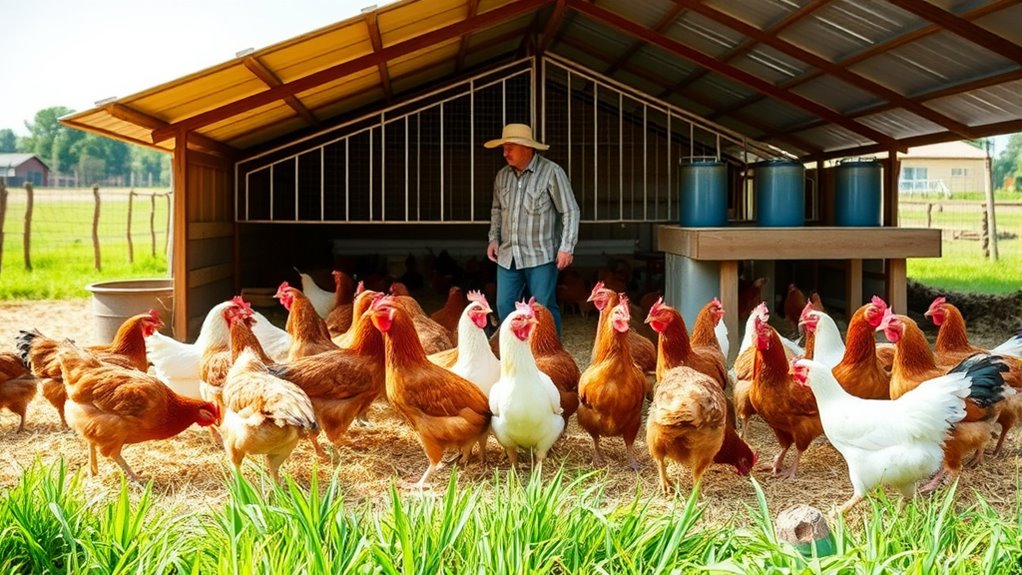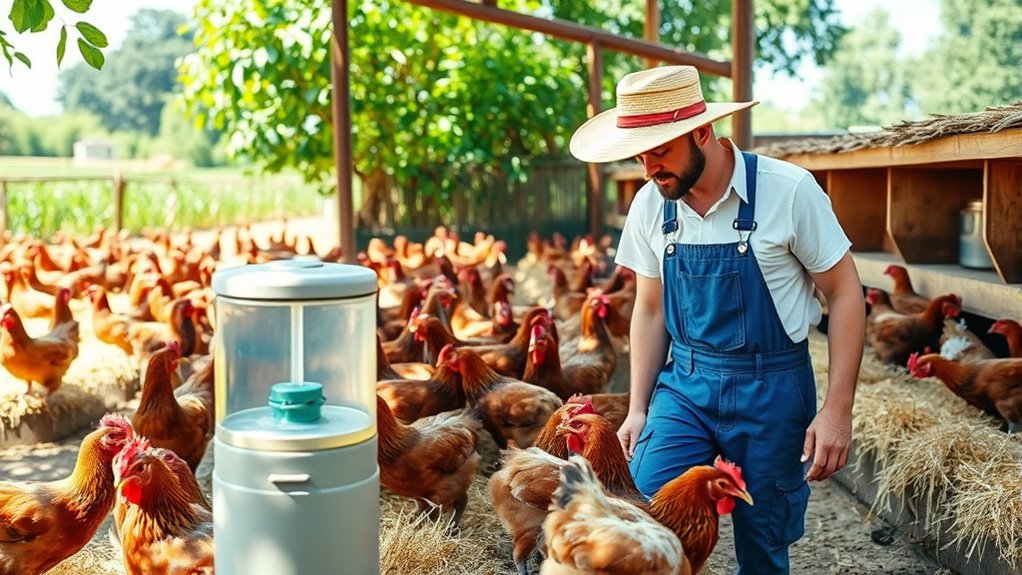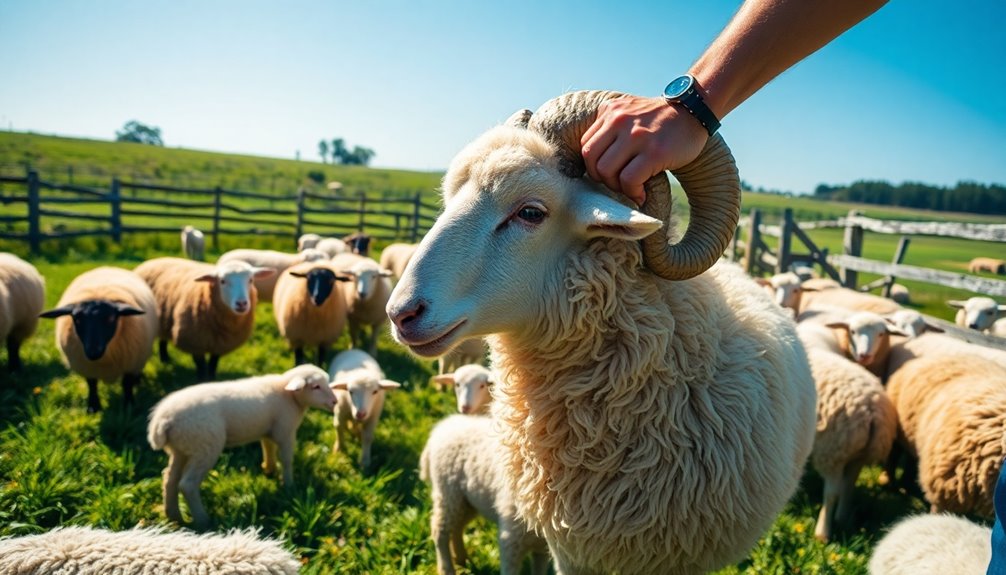To prevent common chicken diseases on your farm, focus on strict biosecurity measures like controlling access, disinfecting equipment, and preventing wild bird contamination. Maintain proper ventilation to reduce humidity and airborne pathogens. Vaccinate your flock routinely against diseases such as Newcastle and avian influenza, following a recommended schedule. Regular health monitoring and record-keeping help catch issues early. Combining these strategies with consistent sanitation practices keeps your chickens healthy—continue for more tips on protecting your flock effectively.
Key Takeaways
- Implement strict biosecurity measures, including controlled access, disinfection, and preventing wild bird contact.
- Ensure proper ventilation to reduce humidity and airborne pathogens in poultry houses.
- Follow a scheduled vaccination program for diseases like Newcastle, bronchitis, and avian influenza.
- Monitor flock health regularly, isolate sick birds, and keep detailed health and vaccination records.
- Educate farm workers on biosecurity protocols and maintain consistent sanitation practices.

Preventing chicken diseases is essential for maintaining a healthy flock and ensuring productive poultry farming. When you prioritize biosecurity measures, you’re taking critical steps to reduce the risk of disease outbreaks. This involves controlling access to your poultry houses, disinfecting equipment regularly, and preventing wild birds from contaminating your flock. Proper sanitation and strict hygiene protocols help eliminate pathogens from the environment, making it harder for diseases to take hold. Implementing a controlled entry system, like footbaths and dedicated clothing, minimizes the chance of introducing infections from outside sources. Keeping your farm clean isn’t just about appearance; it’s about creating a safe space where diseases can’t easily spread. Additionally, maintaining proper ventilation can significantly reduce humidity and airborne pathogens inside your poultry houses, further protecting your flock.
Implementing strict biosecurity measures is vital to prevent disease spread in your flock.
Vaccination protocols are another indispensable component in disease prevention. Vaccinating your chickens against common diseases such as Newcastle disease, infectious bronchitis, and avian influenza can markedly reduce the likelihood of outbreaks. You should develop a vaccination schedule based on your location, the prevalent diseases in your region, and advice from a poultry veterinarian. Consistent vaccination ensures that your flock builds immunity over time, protecting both individual birds and the entire flock. Remember, following the correct procedures during vaccination—such as proper storage and administration—maximizes its effectiveness. An effective vaccination program works hand-in-hand with biosecurity measures to create a formidable barrier against disease.
In addition to these strategies, regular health monitoring plays an indispensable role in early detection. Keep an eye on your chickens for signs of illness, such as lethargy, changes in appetite, or abnormal droppings. Early identification allows you to isolate affected birds quickly, preventing the spread of disease to healthy flock members. Maintaining detailed records of health status, vaccination dates, and any unusual incidents helps you identify patterns and respond proactively. Biosecurity protocols are crucial for minimizing disease transmission, and understanding their importance can help you implement better practices. Conducting routine health screenings can also aid in catching issues before they escalate.
Implementing vetted conversion kits for cleaning and disinfection can further enhance your biosecurity efforts by ensuring thorough sanitation. You should also educate anyone working on your farm about biosecurity protocols and the importance of vaccination. Proper training ensures everyone understands how diseases spread and how to prevent them. Remember, diseases can spread rapidly if precautions aren’t followed consistently. By combining strict biosecurity measures with a comprehensive vaccination program, you considerably lower your risk of losing birds to preventable diseases. Protecting your flock isn’t a one-time effort; it requires ongoing diligence, routine checks, and a proactive approach. Staying vigilant and committed to these practices helps ensure your chickens stay healthy, productive, and profitable.
Frequently Asked Questions
How Can I Identify Early Signs of Disease in Chickens?
You can identify early signs of disease in chickens through symptom recognition, which is key for early detection. Watch for changes like sluggish behavior, ruffled feathers, abnormal droppings, or reduced appetite. Noticing these signs promptly helps you respond quickly, preventing the spread of illness. Regularly observe your flock and keep detailed health records to catch subtle symptoms early, ensuring your chickens stay healthy and productive.
What Are Natural Remedies for Common Chicken Illnesses?
When dealing with common chicken illnesses, you can try natural remedies like herbal treatments such as garlic and oregano, which boost immunity. Nutritional supplements like vitamin C and probiotics help support recovery. Always guarantee your chickens get a balanced diet, clean water, and proper ventilation. These natural approaches can often improve health and prevent more serious issues, reducing the need for antibiotics and keeping your flock healthier overall.
How Often Should I Disinfect Chicken Coops?
You should disinfect chicken coops at least every 2-4 weeks, depending on your cleaning schedules and the level of use. Use effective disinfection techniques, such as scrubbing surfaces thoroughly and applying a suitable disinfectant. Regular cleaning helps eliminate bacteria and parasites, keeping your chickens healthy. Keep an eye on droppings and moisture, and increase the frequency if you notice any signs of illness or buildup.
Are There Specific Vaccines Recommended for Backyard Chickens?
For backyard chickens, you should follow a vaccination schedule recommended by your vet or local extension office. Vaccines like Marek’s disease, Newcastle disease, and infectious bronchitis are often advised for disease prevention. Regular vaccination helps protect your flock from common illnesses and keeps them healthy. Keep track of your vaccination schedule, and guarantee your chickens receive timely shots to reduce their risk of disease and promote overall well-being.
What Should I Do if I Suspect an Outbreak on My Farm?
Think of your farm as a fortress; if you suspect an outbreak, act swiftly to reinforce your defenses. You should implement strict biosecurity measures—limit access, disinfect equipment, and isolate affected birds. Contact your veterinarian immediately for guidance and establish an emergency response plan. Staying proactive helps contain the disease, protecting your flock and maintaining the health of your farm. The quicker you act, the stronger your fortress stands against threats.
Conclusion
By staying attentive and maintaining good hygiene, you create a welcoming environment for your chickens. Keep a watchful eye for any subtle signs and act promptly to keep your flock healthy. Remember, a little proactive care goes a long way in avoiding the more delicate situations. With patience and consistent effort, you’ll nurture a thriving, happy flock that’s less prone to the less desirable surprises. Your dedication guarantees a resilient, joyful farm where your chickens can flourish.










